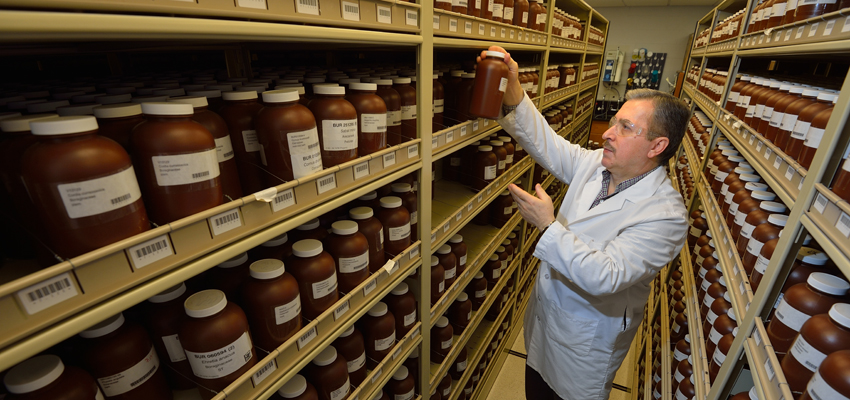Facilities
The National Center for Natural Products Research (NCNPR) was created to bring together an alliance of academia (The University of Mississippi), government, and the pharmaceutical and agrochemical industries to integrate research, development, and commercialization of potentially useful natural products. The Center is the nation’s only university-affiliated research center devoted to discovering, developing and commercializing new pharmaceuticals and agrochemicals derived from natural products. The Center currently operates with a research budget of $10 million, which is derived from a combination of state (Mississippi and University) and federal (USDA) funding and extramural funding in support of specific research activities (e.g., NIH, WHO, USDA, FDA, private foundations and companies).
Current programmatic emphasis is in the discovery and development of anti-infective, anticancer, and immunomodulator/anti-inflammatory drugs and toxicologically and environmentally benign pest management agrichemicals. Research in the Center is focused on using state-of-the-art knowledge and technology to discover bioactive natural products as well as on developing new and novel technologies or processes that facilitate the discovery of bioactive natural products and provide information on existing plant-derived products with medicinal or agricultural applications.
The Center is staffed with a mix of full-time research faculty and support staff of the NCNPR, academic faculty of the School of Pharmacy conducting related research and development activities, and full-time scientists of the USDA Agricultural Research Service (Natural Products Utilization Research Unit). Presently, the full-time research faculty and staff of the Center number over 100, including Ph.D.-level research faculty and scientists, postdoctoral research associates and visiting scholars, and B.S. and M.S.-level technical support staff. In addition, faculty of the School of Pharmacy academic departments hold joint appointments in the Center and contribute to the Center’s research activities. Research scientists and staff of the USDA’s Natural Products Utilization Research Unit are largely responsible for conducting research related to the agricultural aspect of the Center’s mission.
The research and development efforts of the Center are conducted in a complex of adjoining buildings and satellite facilities on the Oxford campus. The central complex consists of the Thad Cochran Research Center East Wing (123,000 square feet), TCRC West Wing (96,000 square feet) and Faser Hall (84,000 square feet).
TCRC East houses faculty, staff and administrators from the School of Pharmacy, NCNPR and the United States Department of Agriculture, Natural Products Utilization Research Unit (USDA-NPURU). Within TCRC East are the Science Library, meeting rooms, three auditoria, and many research laboratories. Constructed in several project packages beginning in 1992, TCRC East was completed in 2008 with the addition of a 250-seat auditorium.
TCRC East is equipped with specialized laboratories for plant extraction, biological screening, isolation and analytical chemistry, synthetic chemistry, molecular modeling, biochemistry, molecular/cell biology, pharmacology/toxicology, plant tissue culture, agronomics, and modern animal facilities. The well-equipped, state-of-the-art animal research facility at TCRC includes a cage wash facility, 32 animal/procedure rooms, and facilities for biocontainment, surgery, and necropsy. Offices, locker rooms, and data entry facilities are next to the animal facility. The faculty and staff are supported by the core facilities, services, and resources that are essential for conducting cutting edge natural products research. The central instrumentation facilities include high field nuclear magnetic resonance spectrometers, high-resolution mass spectrometers, and other spectroscopic equipment required for the characterization and structure elucidation of new natural products. Thousands of biomass specimens and prepared extracts assembled at the NCNPR (the NCNPR Repositories) as well as databases that arise from the research and development activities at NCNPR, are an important resource for the discovery of bioactive natural products.
Faser Hall houses the academic departments of the School of Pharmacy, including research laboratories of the departments of BioMolecular Sciences and Pharmaceutics and Drug Delivery.
